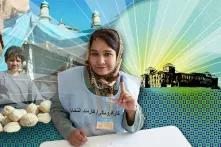
Dr Faramarz Tamana is Head of the Strategic Studies Unit at the Ministry of Foreign Affairs. He also leads the Afghanistan Institute of Higher Education and teaches International Relations.
Please tell us about yourself.
I am someone who always wants to stay in touch with current thinking and new ideas – in order to improve my work and myself. I love Afghanistan and I want to contribute to my country’s development.
Why did you get involved in politics?
For two reasons: One, I always wanted to employ my capabilities towards better politics and governance. And two, my brother used to work at the Afghan Embassy in Tehran, where I would occasionally visit him. I was very impressed by our Afghan diplomats – they were so professional and disciplined.
For you, what is the meaning of “modern politics”?
It can be defined in various ways. First, it is about having a modern outlook. In other words, if politicians are modern, politics will also become modern. Second, like everything else politics requires modern tools. Third, unrelated issues have to be detached from politics. Ultimately, modern politics may be defined as moving beyond traditional politics, thus enabling politics to cope with a changing world.
How do you view the role of young politicians?
In order to develop, Afghanistan badly needs a new generation of politicians. There will be no significant development in Afghanistan unless young people start running the country. We need a generation with modern ideas – ideas compatible with the demands of the 21st century.
Is Afghan society and culture open for young politicians entering the scene?
Unfortunately, there are too few opportunities for young politicians, and rarely are they involved in major decisions. Our senior politicians have lived most of their lives through conflicts and chaos. It was only after 9/11, when a new era began in the country, that they came to power – and thus their aspirations were realised late in their lives. Young people, therefore, are usually nothing but the sidekicks of senior politicians. However, the last decade has offered great educational opportunities for young people. For example, in the Ministry of Foreign Affairs there are many people who had merely finished secondary school but then got the opportunity to go abroad and do a master’s degree. In 2013, the first students to start school after the fall of the Taliban graduated. By 2017, they will have their bachelor degrees. And after that more and more important positions will go to young people.
Do you think Afghan politicians act according to democratic values?
There are great contradictions, something that is common in Third World countries. The main contradiction is between our beliefs and our personalities; our deeds are quite different from what we project. There are even people who teach theories of democracy but have totalitarian personalities all the same. Believing in democracy is quite different from just discussing or talking about it. The number of people whose actions are compatible with what they say is quite low. The majority of people thinks democracy is a project that has been exported to Afghanistan. Democracy is more like a superficial fashion than the basis of governance. However, democracy is not something that can be injected like a vaccine. Democracy is something one has to grow up with. People learn democracy and democratic behaviour from their parents. The Afghan generation of post-2001 is quite different from their predecessors in that it grew up in a relatively democratic environment and thus thinks more democratically. Those, on the other hand, who were 15, 20, or 30 when Afghanistan became a democracy, are often democrats in name only. Thus, for democracy to become institutionalised in Afghanistan we will need another ten years of stability.
What is the outlook for modern politics and young politicians?
I think from 2017 onwards young people will likely play a greater role in politics, as it is estimated that by then 60% of all voters will be young people. Overall the number of educated people in senior positions will rise considerably. However, I have one serious concern: Today, too many young people study the social sciences and the humanities. This is troubling for a country that needs to rebuild and develop its infrastructures, and such an imbalance may very well become an obstacle for the future development of our country.
Are there opportunities to develop modern politics at Afghan universities?
This is negligible. Modern politics has to be based on professionalism. How many Afghan politicians have studied politics? How serious are they about being professionals? What percentage of our lawmakers has studied law? I do not say that all of them need to be legal scholars – we need experts in all areas. Some Afghan universities offer a master’s degree course in International Relations but the teachers have few credentials and little expertise. How can you study International Relations, if the teacher has nothing but a degree in sociology? I think efforts to turn education into a business are damaging the relation between knowledge and politics.
Are there equal opportunities in the fields of politics and political management?
There are very few opportunities in the first place. In major cities like Kabul, Mazar-i Sharif, and Herat the conditions may be better but in all other areas there is little to nothing. There are still very serious social and political issues in Afghanistan.
What do you think will happen over the next ten years?
For almost three decades Afghanistan has been a very backward country, partly because of what Afghans have done, partly because of what our neighbours and other countries around the world have done. However, over the past thirteen years Afghanistan has rebuilt many of its social, economic, and political relations with the rest of the world – and thus experienced some development. The region needs us and the young generation has created the potential for moving forward. Based on this, I do not think that Afghanistan will revert to the past.
